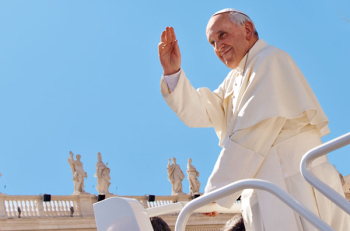A few days ago, those of us on the Christian Bioethics e-mail list got advanced notice of a commentary by Prof. Mark Cherry. Titled “Pope Francis, Weak theology, and the Subtle Transformation of Roman Catholic Bioethics”, Prof. Cherry’s basic thesis is as follows:
Many of Francis’ public statements on bioethics, especially as developed in Evangelii Gaudium, appear to adopt a weak postmodern position; that is, a position that avoids directly underscoring an objectively true moral-theological position. Such a “weak theology” does not require Roman Catholicism to confront secular bioethics directly, much less to convert the world to Christ.
Admittedly, Prof. Cherry was only doing a commentary and thus didn’t have the resources to make a full case. But his piece as it stands is deeply problematic and falls well short showing that his thesis is correct.
A preliminary question to ask is whether Prof. Cherry believes Pope Francis’ overall theology is weak–burdened, as he says, by attempts to avoid an objectively true moral position–or if it is only weak on certain issues. Lots of counter-examples to the former claim come to mind: from his excommunicating a priest in Australia, to the dozens of times he has insisted that solidarity with the poor is an absolute and universal moral requirement, to his strikingly powerful words for the Italian mafia…groups he also declared excommunicated.
But let’s get to the heart of the issues Prof. Cherry really wants to talk about. Though he is oddly-focused on same sex marriage in a piece written for a journal with a very particular specialty, Prof. Cherry’s stated purpose is to engage Francis on bioethics with a particular focus on abortion.
I assume Prof. Cherry agrees that there is a legitimate and important discussion to be had when it comes to pastoral discussion of abortion. And it is true that Francis has taken a pastoral turn since becoming Pope–very similar, in fact,to the one that Benedict XVI also took when he made the transition to his new role. Frankly, I think Francis’ pastoral approach has made him better able to be heard on the issues about which Prof. Cherry cares most deeply. But that is an argument for another post.
What are we to make of Prof. Cherry’s claim that Francis’ “shift toward a weak theology de facto permits him to undo Roman Catholicism’s focus on divisive bioethical issues, such as the condemnation of abortion”? From where would he be getting the idea that the Pope is attempting to undo this emphasis? It is likely from this interview, which gained quite a lot of attention in the American national media:
We cannot insist only on issues related to abortion, gay marriage and the use of contraceptive methods. This is not possible…it is not necessary to talk about these issues all the time. We have to find a new balance; otherwise even the moral edifice of the church is likely to fall like a house of cards.
The Pope isn’t saying that Christians shouldn’t have a focus on divisive bioethical issues like abortion, he is instead saying that when the balance of moral issues we engage is uneven the whole moral edifice comes crashing down. And he is correct about this.
Indeed, the very next day the Pope used strong language on abortion in a speech to a number of OB-GYNs in Rome. Of course, it did not get the same kind of attention from the national media. The speech characterized abortion as a product of a “widespread mentality of profit, the ‘throwaway culture,’ which has today enslaved the hearts and minds of so many.” And it went on:
Every unborn child, though unjustly condemned to be aborted, has the face of the Lord, who even before his birth, and then as soon as he was born, experienced the rejection of the world,” he said. “And every old person, even if infirm and at the end of his days, carries with him the face of Christ. They must not be thrown away! Openness to life is at the center of true development. If personal and social sensitivity in welcoming a new life is lost, other forms of welcome useful to social life will dry up. Welcoming life tempers moral energies and makes people capable of helping each other.
The Pope also unflinchingly told a number of high ranking UN officials that “life is sacred and inviolable from conception until natural death” and once again connected his opposition to abortion as part of the “the ‘economy of exclusion,’ the ‘throwaway culture’ and the ‘culture of death,’ which nowadays sadly risk becoming passively accepted.”
One could produce many dozens of other quotes along similar lines, and here are just a few more to make an even stronger case:
- In a tweet from May of 2013 the Pope said, “It is God who gives life. Let us respect and love human life, especially vulnerable life in a mother’s womb.”
- In a message to the World Council of Churches last year he said, “We are called to reach out to those who find themselves in the existential peripheries of our societies and to show particular solidarity with the most vulnerable of our brothers and sisters: the poor, the disabled, the unborn and the sick, migrants and refugees, the elderly and the young who lack employment.”
- In a speech to the Dignitatis Humane Institute he said, “The victims of this [throwaway] culture are precisely the weakest and most fragile human beings — the unborn, the poorest, the sick and elderly, the seriously handicapped, — who are in danger of being ‘thrown away,’ expelled from a system that must be efficient at all costs.
But perhaps Prof. Cherry’s primary concern here is not about statements made on Twitter and in various speeches, but about presenting a confident claim about the truth of Christian doctrine. Indeed, Cherry puts it this way:
Moral statements may still be made, but they are stated without any emphasis on dogmatic certainty and with an ecumenical openness to the bioethical positions and moral perspectives of others. For example, with weak theology one does not say all should recognize that “abortion is the murder of a child in the womb,” but rather “abortion is the wrong choice for me.” While this second statement may also be true, the real moral and spiritual significance of taking human life has been muted. Pope Francis moves very quickly in Evangelii Gaudium from not quite condemning abortion (“It is not ‘progressive’ to try to resolve problems by eliminating a human life”) to shifting responsibility away from women who choose abortion (“…it is also true that we have done little to adequately accompany women in very difficult situations, where abortion appears as a quick solution to their profound anguish, especially when the life developing within them is the result of rape or a situation of extreme poverty”) (Francis, 2013, 214).
Prof. Cherry is right to cite Evangelii Gaudium as the closest thing the Pope has done to make a doctrinal statement about bioethics during his relatively brief pontificate. But, in citing Francis in full, it becomes clear Prof. Cherry’s strong claims cannot be sustained. My emphasis is added:
213. Among the vulnerable for whom the Church wishes to care with particular love and concern are unborn children, the most defenceless and innocent among us. Nowadays efforts are made to deny them their human dignity and to do with them whatever one pleases, taking their lives and passing laws preventing anyone from standing in the way of this. Frequently, as a way of ridiculing the Church’s effort to defend their lives, attempts are made to present her position as ideological, obscurantist and conservative. Yet this defence of unborn life is closely linked to the defence of each and every other human right. It involves the conviction that a human being is always sacred and inviolable, in any situation and at every stage of development. Human beings are ends in themselves and never a means of resolving other problems. Once this conviction disappears, so do solid and lasting foundations for the defence of human rights, which would always be subject to the passing whims of the powers that be. Reason alone is sufficient to recognize the inviolable value of each single human life, but if we also look at the issue from the standpoint of faith, “every violation of the personal dignity of the human being cries out in vengeance to God and is an offence against the creator of the individual”.[176]
214. Precisely because this involves the internal consistency of our message about the value of the human person, the Church cannot be expected to change her position on this question. I want to be completely honest in this regard. This is not something subject to alleged reforms or “modernizations”. It is not “progressive” to try to resolve problems by eliminating a human life. On the other hand, it is also true that we have done little to adequately accompany women in very difficult situations, where abortion appears as a quick solution to their profound anguish, especially when the life developing within them is the result of rape or a situation of extreme poverty. Who can remain unmoved before such painful situations?
Prof. Cherry may not agree about the pastoral and doctrinal balance that the Pope has struck in his preaching and teaching on morality. My own sense is that if we wish to bring Christ to the world, Francis’ consistent ethic of life is precisely the correct balance to strike, especially if one is reading the signs of the times correctly. But that is a much more complex issue than the one taken on in this post, and reasonable people can disagree. But when one gets beyond the thin engagement and analysis offered in this commentary by Prof. Cherry (and, for that matter, in the American media), it becomes very clear that Pope Francis does not offer either weak theology or weak bioethics. Quite the contrary.




Very thoughtful post. I have no way of knowing, but I would not be surprised to find the life issues treated again in the encyclical that (everyone says) is being prepared on the environment. I suspect he will pick up themes (as he already has) on the “human ethos” that Pope Benedict spoke about. I do not think the Holy Father has retreated at all on the life issues. He is, I think, working to have them “re- embedded” in a faith/reason context that can both support the weight and communicate the message. In this sense he is in the line of Benedict for whom communicating the message of human dignity to a world that experiences morality as voluntarist at its root was a major preoccupation. I think it preoccupies Pope Francis also,